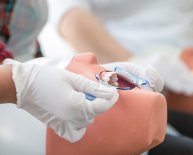
Oral Health for Children
The ADA recommends that children see a dentist by their first birthday. At this first visit, the dentist will explain proper brushing and flossing techniques and do a modified exam while your baby sits on your lap.
These visits can help find potential problems early and help kids get used to visiting the dentist so they'll have less fear about going as they get older. Consider taking your child to a dentist who specializes in treating kids. Pediatric dentists are trained to handle the wide range of issues associated with kids' dental health. They also know when to refer you to a different type of specialist, such as an orthodontist to correct an overbite or an oral surgeon for jaw realignment.
If a child seems to be at risk for cavities or other problems, the dentist may start applying topical fluoride even before all teeth come in (this also can be done in the pediatrician's office). Fluoride hardens the tooth enamel, helping to ward off the most common childhood oral disease — dental cavities (also called dental caries).
Preventing Cavities
Cavities happen when bacteria and food left on the teeth after eating are not brushed away. Acid collects on a tooth, softening its enamel until a hole — or cavity — forms.
Here's how to keep cavities away:
- Start good oral habits early. Teach kids to brush at least twice a day with fluoride toothpaste and to floss regularly.
- Regular use of fluoride toughens the enamel, making it harder for acid to penetrate. Although many towns require tap water to be fluoridated, others don't. If your water supply is not fluoridated or if your family uses purified water, ask your dentist for fluoride supplements. Most toothpastes contain fluoride but toothpaste alone will not fully protect a child's teeth. Be careful, however, since too much fluoride can cause tooth discoloration. Check with your dentist before supplementing.
- Limit or avoid certain foods. Sugary foods, juices, candy (especially sticky gummy candy, gummy vitamins, or fruit leather or "roll-ups") can erode enamel and cause cavities. If your kids eat these foods, have them rinse their mouth or brush their teeth after eating to wash away the sugar. The same goes for taking sweetened liquid medicines: always have kids rinse or brush afterward.
As your child's permanent teeth grow in, the dentist can help prevent decay by applying a thin wash of resin (called a sealant) to the back teeth, where most chewing is done. This protective coating keeps bacteria from settling in the hard-to-reach crevices of the molars. But make sure that kids know that sealants aren't a replacement for good brushing and regular flossing.

















